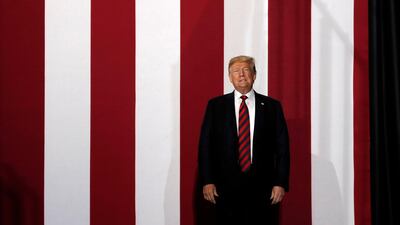China has called off planned trade talks with the US and is unlikely to sit down with Washington until after the mid-term elections, according to Bloomberg.
Beijing has withdrawn a planned delegation to Washington next week, sources said. The Wall Street Journal earlier reported that China had scrapped plans to send vice-premier Liu He and a mid-level delegation.
In addition to new tariffs on $200 billion of Chinese goods set to go into effect on Monday, the US State Department sanctions against China’s defence agency and its director last week contributed to the ultimate decision to cancel the talks.
In his push for what he calls a level playing field in dealing with China, President Donald Trump slapped the new tariffs on imports from China and threatened more if Beijing retaliated. Last week China said it would impose levies on $60bn worth of US goods effective from Monday.
The new tariffs brought “new uncertainties” to China-US negotiations, Gao Feng, a spokesman of China’s Ministry of Commerce said, when answering a question at a press conference last week on whether the countries would have a new round of trade talks. He used exactly the same wording the ministry used in an earlier statement.
_________
Read more:
US-China trade war means 1 million US jobs pledge is off, Jack Ma says
Trump slaps tariffs on $200bn of Chinese goods and Beijing retaliates
As Trump turns up heat, China starts to sweat
Donald Trump tells Apple to make products in the US
_________
The Ministry of Commerce and the Ministry of Finance did not respond to faxes inquiring about the matter on Saturday.
Earlier, the Trump administration said it needs to confront China over its trading practices to defend US long-term interests even as the escalation risks causing pain for American consumers. Inaction would leave the US economy and consumers worse off over the longer run, a senior administration official told reporters on Friday.
US industry has widely pushed back against the Trump administration’s use of tariffs to force changes to China’s economy, and companies from Walmart to Gap and Samsonite International have said they are prepared to raise prices if the new tariffs bite into their business.
Mr Trump’s biggest strike yet in a growing trade fight between the world’s biggest economies will see a 10 per cent duty applied to $200bn of Chinese imports, which could rise to 25 per cent next year. He’s threatened duties on a further $267bn of made-in-China goods, which would hit almost all other consumer products including mobile phones, shoes and clothes.
The latest round of duties comes on top of a 25 per cent tariff already imposed on about $50bn in Chinese goods, which spurred counter-tariffs from Beijing.
Mr Trump continued to hit out at China late this week, signaling the trade war will not end any time soon.
“It’s time to take a stand on China,” he said in an interview with Fox News last week. ”We have no choice. It’s been a long time. They’re hurting us.”
“The new US tariffs on Chinese goods, mostly consumer-oriented, will depress spending and hurt the retail sector beginning in 2019,” Seema Shah and Danielle McIntee, said analysts with Bloomberg Intelligence. “Lower-income families, already pinching pennies, are most exposed, given the likelihood of tariff-related price increases on everyday items.”
Commerce Secretary Wilbur Ross earlier this week said the tariffs are spread over such a wide range of goods that Americans should not notice price increases.
“We were trying to do things that were least intrusive on the consumer,” Mr Ross said on CNBC on Tuesday. “We really went item-by-item trying to figure out what would accomplish the punitive purpose on China and yet with the least disruption in the US.”

